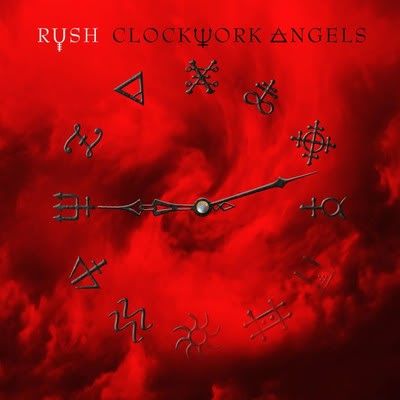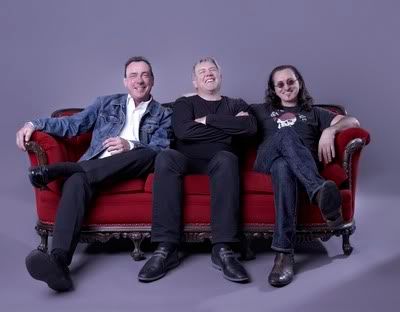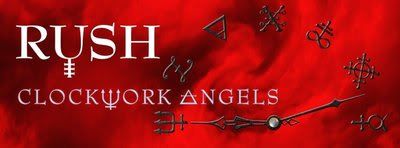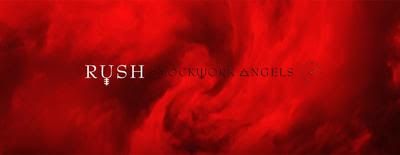RUSH - Martin Popoff Reviews Clockwork Angels
May 24, 2012, 12 years ago
RUSH's anxiously-awaited new album Clockwork Angels will be released on June 12th via Anthem/Universal in Canada and their debut for Anthem/Roadrunner Records in the US. Revered BraveWords.com Editor In Chief Martin Popoff has heard the album and provides (as usual) an in-depth, step-by-step, track-by-track synopsis of the magnum opus we are all just dying to wrap our ears around! Check out his massive glowing 10/10 review below:

Hard to believe, but this is the first full concept album for the Willy Wonkas of prog metal, Clockwork Angels being a complicated, oblique, angled tale involving less steampunk than rumour had it and much more about the march of time, all wrapped up in the meaninglessness for the non-believer, except for some sort of inner temple-building, or a garden as it were, Candide-style. If Vapor Trails was in the spirit (but not the sound) of red, yellow and blue Crimson (frantic, textured, high on the shelf), Clockwork Angels is in the glorious yet dour (an apt result of ascribing to Neil’s belief system) spirit of Wetton-era Crimson mixed with Van Der Graaf Generator, with all the Victorian weight lead-lined in a box of the two institutions. And therein lies one of a few steampunk nods, as there’s no one more “watchmaker” than Peter Hammill.
A singular Rush triumph results, and yes, before we even get to the music, there really is so much to ponder here, as there’s lyrics, light narration, visuals, and then an exo-story by Kevin J. Anderson. And like the best concept albums, the lyrics alone are mostly abstraction, with further abstraction caused by demarcation into their necessary chapters, welcome, so that these hugely ambitious and exclusively dark songs can stand on their own as Rush songs, soon to be mouthed by crowds in the wrongness for this of hockey barns.
But the concept nature is not the least of why this feels like the most unified and purposeful Rush album since Vapor Trails and before that, Signals and its pastels – it’s the baffling music, an almost new invention, or new is old, or “the future as it’s meant to be” in steampunk parlance. Gone is Alex’s trinket of layering in acoustic to accompany the riff (I always thought this sounded like a tear in the woofer), and also gone, then, logically, is any of the tinkle in Rush production, the brightness, which started with Grace and then reared its head to varying degrees and with often enrageable persona throughout, on every album, save I suppose for Vapor Trails.
No, what we have here is Rush’s bassiest production quake ever. Neil’s drums have never sounded so fat, warm and powerful, and Geddy and Alex storm on along with him, through track by blustery track, many neo-Maiden- and Death Magnetic-like in their sodding of conventional verse/chorus structure in redefinition of the word “break.” The boomy resonance of all this was captured inside of three months at a brand new/one-year-old studio in Toronto called Revolution Recordings, and through an approach that had Geddy and Alex writing their crazy musicks, then handing it to Neil to make sense of. The Professor then supposed for himself a pile of spontaneity (an oxymoron, until you hear how much exertion is necessary through the album’s 66.6 minutes), literally conducted with a drumstick by producer Nick Raskulinecz, who would and obviously could suggest fills by singing them like a Three Stooges routine (which makes him the fourth Stooge).
The result is Neil’s grooviest playing ever, groove being the one area Neil, by necessity of Rushwriting, rarely bothered himself with – I think he’d have to admit he’s a white man playing the drums. Ergo, he gorgeously falls off the end of bars all around Clockwork town, helping to create a hot mess of a ‘70s prog album, the type that would never sell, but to fellow English cynics born out of tyme, squelching through the moors.
You’ll be glad to know at least one person (me) thinks the balance of Clockwork Angels is actually better than the two old/advance songs ‘Caravan’ and ‘BU2B’, but that both those songs fit, despite their being recorded a year and a half earlier than the balance. Both are essentially slide rule grunge, the first, about getting away from the family farm, the next, as Neil surmises, faith-bashing, which sets up the dark cloud over how time rapes us over the rest of the album.

The title track comes next (and ain’t it cool that the distraction of the two songs we know, and even know in a live setting, is over with?), and it’s one of many with a huge swooping finale that could close an album or a show. And the remarkable picture that emerges now is that of a future imagined from 120 years ago, a world lit only by fire and all that, steam, of contraptions – this is now graphically, sonically, aurally, representingly (!) being played out in the ragged, 21st Century schizoid music. If there was prog, and then the undisputable invention of a singularly bright neo-prog by Rush… they were the future Kings in 1977, but one wonders if the future of prog imagined in 1971 would have been closer to the inefficient frump of Red-era King Crimson – or Clockwork Angels. For to be sure, the snap of Permanent Waves is not here. This is Rush looking at mortality carrying around Alex’s extra 15 pounds and Geddy’s deteriorating, yodel-era voice, and probably Neil’s knees any month now. In other words, there’s a worn wisdom here, and the guys turn in their most inspired music, even at and inside the improbable crucible of jammy spontaneity, and then Neil writes perfectly in line (as if we want to ascribe order when there is none), with layers of enigma, a feast for hours of reflection.
Back to the record, ‘The Anarchist’ is aptly named as it conjures another subtle dimension to the whole, and that’s post-punk, Alex and Ged angling their chords and melodies, everything more sour than sweet, Neil jamming, this one with a Vapor Trails vibe. A ringing Beatles chord ends it, which brings up another creep, that of these haunting inter-song bits, which evokes the Shining-like horror of the lone Trader Horne album.
‘Carnies’ hit me hard between the eyes, lyrically, as it immediately conjured the classic noir of William Lindsay Gresham’s Nightmare Alley. Rush is off on another ass-over-head trip into the crypt, Neil bashing away, more gobs of Magazine-like heavy post-punk, weird chords in the chorus. Bloody ‘ell, ‘Halo Effect’ perpetuates the (coincidental) connection with Nightmare Alley, making me want to read it again, and dragging further immersion into the album’s insistent, consistent, boomy, garagey, welled-up-with-wattage claustrophobia.
Mysterious, Manchestered and explosive, this one leads to ‘Seven Cities Of Gold’, influenced by Cormac McCarthy, other influences around the stultifying environs including John Barth, Michael Ondaatje, Joseph Conrad, and come ‘The Wreckers’, Dauphne du Maurier. ‘The Wreckers’ had Alex and Ged switch instruments for the writing, but go back when time to get serious. It’s about a shipwreck, and for some reason, conjured the fantastical Imaginos saga from Sandy Pearlman and Blue Oyster Cult, that perhaps being an even better steampunk tale than this.

‘Headlong Flight’ is the album’s true advance single, the way it was done in the old days, and it opens with a ‘Bastille Day’ drum quote and proceeds eventually to a White Album-style chorus, so passion-filled but still, in total, weirdly dark and detached, or perhaps bitter about how life all necessarily plays out at the second, minute and hour hands of Chronos.
‘BU2B2’ is the first or clearest indication of what is probably the most uneasy use of string arrangements on a hard rock record, which will play out further come closer ‘The Garden’. Real 16-piece (I think) section, at the hands of David Campbell. No drums, Eno/Glass-like, haunting, which contrasts jarringly to the album’s party rocker, ‘Wish Them Well’, which aggravated Neil to no end in the bread-making. Odd, ‘cos this one rocks most forthrightly, despite a Byrdsy tinge to the chorus. Calling ‘Stick It Out’ the heaviest Rush song becomes hard lifting under the weight of much of this album.
‘The Garden’ closes the journey, with another almost laughably epic flourish (although the epic surge is undermined by sorta like the hangover of the epic, in the final strained strains). It’s a chilling finale, supposed to give hope, but more about how the (aforementioned) idea of Candide’s garden… in the final analysis what else have you got? It’s all very Zen-like as is the musical accompaniment which oscillates between operating room anesthesia drone and heavy metal drone.
And that’s it, that’s really it, actually – heavy metal drone, a hot mess of it, enticingly sliced up and shifted over and over again, a very strange landscape of obscure prog metal of a most curmudgeonly and English type, piled on with more worthy intellectual ideas from Neil as he grows and grows into a finer fiction writer all the time. Curious to see how Clockwork Angels is received out there, ‘cos I can see there being a lot of exasperation. No matter what the response, one can’t deny that there’s more purpose and focus here than on any Rush album ever, save perhaps for the sad anguished and sad Vapor Trails.












